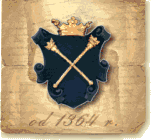
Uniwersytet Jagielloński
Kraków, Poland

The Catholic University of America
|
Uniwersytet JagiellońskiKraków, Poland |
The Catholic University of America |
| Ken Pennington Email: Pennington@cua.edu and Kenneth.Pennington3@verizon.net (Click on addresses to send Email) |
|
|
Origins of the Civil and Common Legal Institutions: Procedure, Case Law, Jurists, and Codification |
Required Readings:
Ken Pennington, "Roman and Secular Law in the Middle Ages"
Ken Pennington, "Innocent Until Proven Guilty: The Origins of a Legal Maxim
Ken Pennington, "Learned Law, droit savant, gelehrtes Recht: The Tyranny of a Concept"
Kenneth Pennington, "A Short History of Canon Law"
Kenneth Pennington, "The Ius commune, Suretyship, and Magna carta"
Kenneth Pennington, "The History of Rights in Western Thought"
Lectures Topics
I. Introduction, Definition of Terms, Conceptions of
Comparative Legal History
Purpose of the Course and a Short Introduction to the Jurisprudence of Law
Readings:
Ken Pennington, "Spirit of Legal History"II. Revival of Law in the Twelfth Century, Case Law, and the Birth of Procedure in the Ius commune
The Establishment of the Ius commune
For a discussion of the concept of Ius commune, read Pennington, "Tyranny of a Concept."
Gratian, the Founder of the Case Law Method
The Development of Case Law in Canon Law
Case Law in Canon Law: Papal Decretals
Decisiones Romanae Rotae: Thomas Fastolf, Decisiones novae, antiquae et antiquiores 1348
Case Law in the Ius commune: Consilia (Briefs)
Development of the Norms of Procedure in the Ius commune
Key terms: Cognitio extraordinaria, ordeal, ordo iudiciarius, due process
The evolution of procedure in the Ius commune during the Twelfth and Thirteenth Centuries
Readings: Pennington, "Due Process"
IV. The Work of the Jurists in Late Medieval and Early Modern Europe: "Rights-Based" Jurisprudence in the Ius commune
| Rights of Due Process Rights of Property, Contract, and Marriage Rights of Non-Christian Peoples: The Beginnings of International Law |
|
Pennington, "Due Process, Community, and the Prince in the Evolution of the Ordo iudiciarius" Pennington, Innocent until Proven Guilty: Origins of a Maxim |
|
Also this review of a book by Tierney will help you to understand the main developments of natural rights in pre-modern legal thought: Review of Tierney
|
|
V. The Idea of Codification and the History of Case Law
Codification of Law in the Twelfth and Thirteenth Centuries
|
Final Paper:
Compare and contrast Procedure or Case Law or Judges or Jurists or Codification
in the Civil and Common Law Traditions (4 pages).
The final paper should be submitted to me by email in either a Word or a WordPerfect attached file. Be sure that you put your name on the essay and use your name as the file name. If you use a Mac, then send me the text in the body of the email. I should receive your essay by November 27, 2002. If you have questions about the essay, please send me an email.